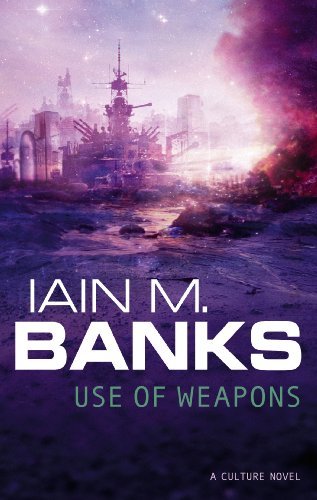What do you think?
Rate this book


The third Culture novel from the awesome imagination of Iain M. Banks, a modern master of science fiction.
The man known as Cheradenine Zakalwe was one of Special Circumstances' foremost agents, changing the destiny of planets to suit the Culture through intrigue, dirty tricks or military action.
The woman known as Diziet Sma had plucked him from obscurity and pushed him towards his present eminence, but despite all their dealings she did not know him as well as she thought.
The drone known as Skaffen-Amtiskaw knew both of these people. It had once saved the woman's life by massacring her attackers in a particularly bloody manner. It believed the man to be a burnt-out case. But not even its machine intelligence could see the horrors in his past.
Praise for the Culture series:
'Epic in scope, ambitious in its ideas and absorbing in its execution'
Independent on Sunday
'Banks has created one of the most enduring and endearing visions of the future'
Guardian
'Jam-packed with extraordinary invention'
Scotsman
'Compulsive reading'
Sunday Telegraph
The Culture series:
Consider Phlebas
The Player of Games
Use of Weapons
The State of the Art
Excession
Inversions
Look to Windward
Matter
Surface Detail
The Hydrogen Sonata
Other books by Iain M. Banks:
Against a Dark Background
Feersum Endjinn
The Algebraist
516 pages, Kindle Edition
First published March 1, 1990

The book is made up of two narrative streams, interwoven in alternating chapters. The numbers of the chapters indicate which stream they belong to: one stream is numbered forward in words (One, Two ...), while the other is numbered in reverse with Roman numerals (XIII, XII ...). The story told by the former moves forward chronologically (as the numbers suggest) and tells a self-contained story, while the latter is written in reverse chronology with each chapter successively earlier in Zakalwe's life . . . Further complicating this structure is a prologue and epilogue set shortly after the events of the main narrative, and many flashbacks within the chapters.
“There are two stories, but you know most of one of them. I’ll tell them at the same time; see if you can tell which is which.”The hyper-advanced civilization that calls itself "The Culture" views itself as thoroughly utopian: post-scarcity, anarchistic yet pacifist, honest and easy-going, giving equal respect to all, whether mortal or machine. Out of beneficence--or boredom--the Culture has set itself the task of bringing a little of its enlightenment to the surrounding civilizations--but of course the altruism is entirely unadulterated by imperialism.
"There is no certainty; least of all in Special Circumstances, where the rules are different [...] we deal in the moral equivalent of black holes, where the normal laws— the rules of right and wrong that people imagine apply everywhere else in the universe— break down; beyond those metaphysical event horizons, there exist ... special circumstances.”But it is the Culture that chooses where the laws apply and where they bring these special circumstances to bear.
"I," said the man, "am called Cheradine Zakalwe." He leveled the gun at Ethnarch's nose. "You are called dead."However, after his last mission went awry, something seemed to change for Zakalwe. He abandoned his position as one of the Culture's top fixers. It isn't easy to escape the Culture Minds, but Zakalwe was up to the challenge--with standard Zakwalwe style, his escape involved frying a supervisory missile in an MRI. Now, however, his Culture handlers have been given a mission that only Zakalwe can accomplish, and his life of isolated retirement will soon be broken.
"He saw a man with two shadows [...] it was two things: it was the need and it was the method. The need was obvious: to defeat what opposed its life. The method was that taking and bending of the materials and people to one purpose, the outlook that everything could be used in the fight; that nothing could be excluded, that everything was a weapon, and the ability to handle those weapons, to find them and choose which one to aim and fire; that talent, that ability, that use of weapons."I think I found Zakalwe's motivations and actions to be too pragmatic, too alien, to feel real. The slow revelation of his story only compounded my sense of this dissonance.
"You used those weapons, whatever they might happen to be. Given a goal, or having thought up a goal, you had to aim for it, no matter what stood in your way. Even the Culture recognized that."
 - https://www.goodreads.com/review/show...
- https://www.goodreads.com/review/show... - https://www.goodreads.com/review/show...
- https://www.goodreads.com/review/show... - https://www.goodreads.com/review/show...
- https://www.goodreads.com/review/show... - https://www.goodreads.com/review/show...
- https://www.goodreads.com/review/show... - https://www.goodreads.com/review/show...
- https://www.goodreads.com/review/show... - https://www.goodreads.com/review/show...
- https://www.goodreads.com/review/show... - https://www.goodreads.com/review/show...
- https://www.goodreads.com/review/show... - https://www.goodreads.com/review/show...
- https://www.goodreads.com/review/show... - https://www.goodreads.com/review/show...
- https://www.goodreads.com/review/show... - https://www.goodreads.com/review/show...
- https://www.goodreads.com/review/show... - https://www.goodreads.com/review/show...
- https://www.goodreads.com/review/show... - https://www.goodreads.com/review/show...
- https://www.goodreads.com/review/show... - https://www.goodreads.com/review/show...
- https://www.goodreads.com/review/show... - https://www.goodreads.com/review/show...
- https://www.goodreads.com/review/show... - https://www.goodreads.com/review/show...
- https://www.goodreads.com/review/show...
Despite being the third of Banks' "Culture" science fiction novels to be published, he wrote a much more complex version of this story in 1974, before any of his books saw print. He later said it was so complex it "was impossible to comprehend without thinking in six dimensions". He credits fellow Scottish author Ken McLeod with getting him to sort this baroque novel into a publishable form.